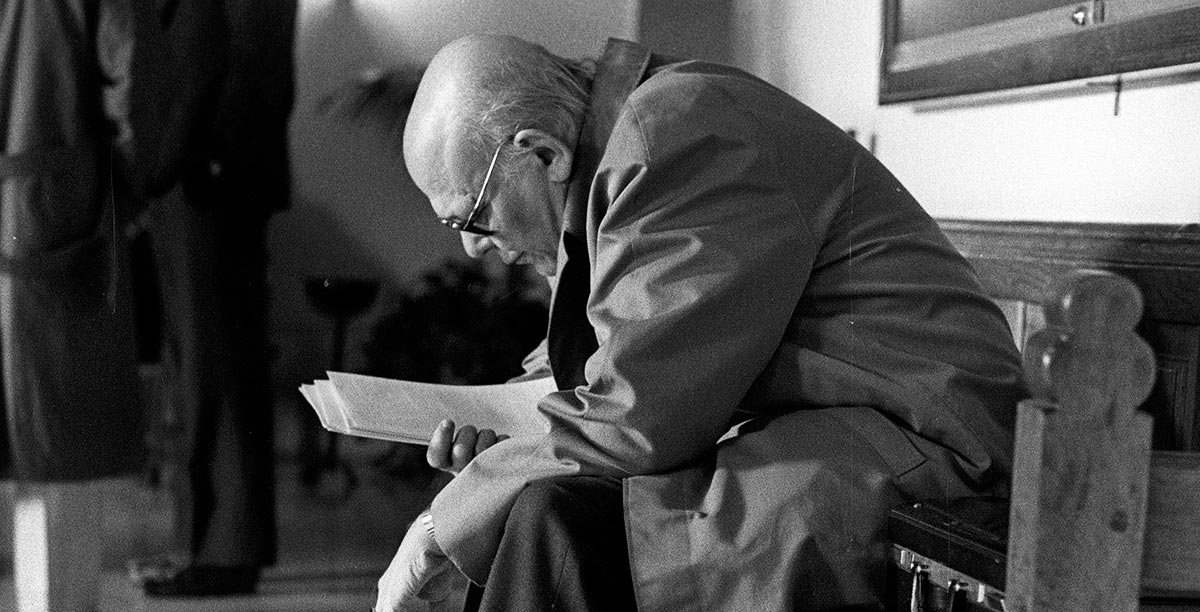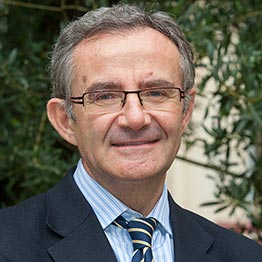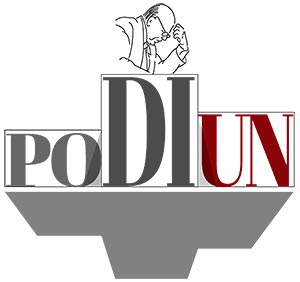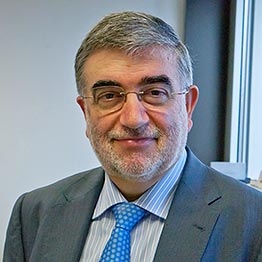University of Navarra Digital Pole (PODIUN)

presentation
The project "Polo Digital University of Navarra", hereinafter PODIUN, aims to create a digital corpus of the Collected Works of Leonardo Polo, Corpus Poliano, and to facilitate its research by means of digital tools that allow for dynamic internal concordances of the work. The project is approached from the perspective of the Digital Humanities and using emerging resources of this discipline. More specifically, some from the field of artificial intelligence such as Natural Language Processing (NLP) and the creation of instructions from data of knowledge.
This project requires an interdisciplinary approach to put digital resources at the service of the Philosophy , with a more systematised and complete processing of the texts already published in Series A of the Complete Works of Leonardo Polo, in twenty-seven volumes, as well as for the rest of the texts that are being prepared for later publication. The general goal of project is the dissemination of Leonardo Polo's work, as it has been proven that his thought has great innovative potential in various areas of knowledge. In spite of this, its dissemination is slowed down by the lack of available digital resources suitable for a more agile in-depth study of a work as enormous and rich as that of the author.
The specific results that the project PODIUN aims to achieve would be, firstly: to define and systematise a methodology for the univocal referencing of Polo's entire work, in the same way as other corpora such as those of Aristotle, Thomas Aquinas or Kant. As a consequence of the creation of this database of references, we also intend to obtain other results such as: i) to have a dictionary/glossary of terms; ii) to use a processing resource of data to provide the corpus with a resource to obtain dynamic concordances of terms with the quantifications of their relations; this will allow advanced intelligent dynamic searches throughout the corpus with an open design and especially developed to deepen the research of the Polian Philosophy .
partnership This project will work closely with EUNSA, publishing house , which owns the copyrights of the Polian work and with which previous agreements have already been reached. Phase I of project will work with the texts already published in Series A of the Collected Works of Leonardo Polo. The creation of this corpus is intended to facilitate the discussion of his ideas in international circles. The processing resource and reference letter is intended to be a catalyst for extracting the power of the author's thought. The richness of the work will be more fruitful through the technology we have at our disposal at this historical moment. The project also has the support and partnership transversal support of international researchers from five countries and eight universities.
Finally, the publication of these results will be a valuable contribution that the University of Navarra can make to academic community by making these computerised text analysis resources available to research via the Internet.
The "Digital Polo University of Navarra" project, hereinafter PODIUN, aims to create a digital corpus of the complete works of Leonardo Polo, Corpus Poliano, and facilitate their research using digital tools that allow internal dynamic concordances of the work. The project is approached from the perspective of Digital Humanities and using emerging resources from this discipline. More specifically, some of the field of artificial intelligence such as Natural Language Processing(NLP) and the creation of knowledge databases.
This project requires an interdisciplinary approach to put digital resources at the service of philosophy, for a more systematic and complete processing of the texts already published, Series A of Leonardo Polo's complete Works, contained in twenty-seven volumes, as well as for the other texts that are being prepared for subsequent publication. The general objective of the project is the dissemination of Leonardo Polo's work, since it is found that his thinking has great innovative potential in various areas of knowledge. Despite this, its dissemination is hampered by the lack of available digital resources capable of delving more agilely into a work as huge and rich as the author's.
The concrete results that the PODIUN project aims to achieve would be, in the first place, to define and systematize an unambiguous referencing methodology for all of Polo's work, just as another corpus such as those of Aristotle, Thomas Aquinas and Kant already have it. As a consequence of the creation of this database of references, it is additionally intended to obtain other results such as: i) having a dictionary/glossary of terms; ii) use a data processing resource to provide the corpus with a resource to obtain concordance of dynamic terms with the quantifications of their relationships, this will allow advanced intelligent dynamic searches throughout the corpus with an open design and specially developed for deepening the investigation of Poliana philosophy, etc.
This project will work in close collaboration with EUNSA, the publisher of the Poliana work and with which previous agreements have already been reached. In this Phase I of the project we will work with the texts already published in Series A of Leonardo Polo's Complete Works. The creation of this corpus is intended to facilitate the discussion of their ideas in international settings. The processing and reference resource is intended to be a catalyst that allows the author's thinking power to be extracted. The wealth of the work will be more fruitful through the technology that we have in these historical moments. The project also has the support and cross-cutting collaboration of international researchers from five countries and eight universities.
Finally, the publication of these results will be a valuable contribution that the University of Navarra can make to the scientific community by making these computerised text analysis resources available to research via the internet.
Hypotheses
The hypothesis of work is that the Polian work, given its breadth, depth and internal coherence, is suitable for the application of technological resources (Humanities Digital) to facilitate access to its content, specialised programs of study , cataloguing, publication and dissemination through the digital platform.
goal General:
To disseminate the work of Leonardo Polo through the development of a digital platform with text analysis and other resources to give international reach to the work(Corpus Poliano digital platform).
Specific objectives:
-
Reference and/or catalogue Polo's work Seria A in order to access it in an efficient and standardised way. This will allow a more exhaustive and rigorous search for all researchers(univocal referencing methodology).
-
promote and encourage new research through the creation of a glossary-dictionary of Polian terms. To encourage discussion and clarification of issues that are currently undefined, through the dynamic production of concordances of texts.(Concordances of the Polian work and Glossary-dictionary)
-
Generate a plan for work based on a technological method for Humanities that can be replicated in the B Series of the Complete Works.
Benefits for society
Last year (2019), Series A of the Complete Works of Leonardo Polo in 27 volumes has been published by Eunsa (approx. 10,000 pages). There remain the unpublished works and a multitude of recorded tapes that will make up Series B, which is currently being worked on. Polo, who began the Philosophy at the University of Navarre at the suggestion of Saint Josemaría, is the most powerful thinker up to the present day, because he has not only continued and developed the great discoveries of the classics (Aristotle, St. Thomas...) on a grand scale, but also the great works of the classics (Aristotle, St. Thomas...). Thomas...), but has also clearly rectified the errors core topic of the most famous modern (Descartes, Spinoza, Leibniz, Hume, Kant, Hegel...) and contemporary (Marx, Nietzsche, Husserl, Heidegger...) thinkers, and stands out, with no one else to overshadow him, in the most central areas of the Philosophy: Transcendental anthropology or anthropology of intimacy, Metaphysics, Ethics, Theory of knowledge... because he has not only given incontrovertible foundations to these disciplines, but has also made unsuspected progress in his discoveries.
What is the current impact of his works? For the state of crisis in which thought currently finds itself, Polo is the only author of substance who is being disseminated throughout the world, and this despite the language barrier - there is still no English translation of his work - (he is also the most cited in Spain). But his advantage is not of the present, but of the future, because his thought is as profound as it is far-reaching, which takes a long time to immerse oneself in and whose understanding should not be taken for granted, as can happen with any of the celebrities, although it is true that his simpler works can be understood by anyone at university level. Advantage of favouring his dissemination? As Polo is -by far- the author who is the one who most bases the pieces core topic of the Philosophy -access to God, the dignity of the human being, his freedom, personal knowledge and love, human growth according to intellectual habits and virtues of the will, the sense of work, social links in his instructions, family, university, business..., as he connects all these pieces with the central truths of Christian revelation and the message of Saint Josemaría, and carries it out in modern language, it can be said that the other Philosophy have already been and that this one is the future.
Transfer of results
This project has as its goal
- Unify all the Polian material (from Series A) on a digital platform, with a text analysis tool that facilitates the deepening and advancement researcher of Leonardo Polo's inspirational Philosophy .
- Production of a Concordance Book of the Polian Works and a Glossary-Dictionary.
- It is also planned to organise an international congress (2023) with the topic: "The Thought of Leonardo Polo from the Humanities Digital", where the platform will be presented. This event will be a preparatory event for the commemoration of the centenary of Leonardo Polo's birth (2026).
Principal investigator
-
Juan Fernando Sellés
Other researchers at the University of Navarra
-
Santiago Tejero Matía
-
Gonzalo Alonso Bastarreche
-
Graciela Soriano
Other researchers from other centres or universities
-
Juan A. García González
-
Ignacio Falgueras Salinas
-
Genara Castillo Córdoba
-
Blanca Castilla de Cortázar
-
Ana Isabel Moscoso Freile
-
Silvia Martino
-
framework Antonio García Kihn
-
David González Ginocchio
-
Idoya Zorroza
-
Urbano Ferrer
-
Juan José Padial
-
Alberto Vargas
Other associated researchers not attached to a centre
-
María José Franquet
-
Louis Cardona
-
Ana Bastidas
-
Priscila Guerra
-
Joaquín León
-
Guillermo Navarro
-
Juan Pablo Puy
-
Jan Podhorski
-
training sessions for end-users of the Polian Corpus.
-
congress International "Corpus Poliano & PODIUN".
With the goal of the presentation of the Polian Corpus and the platform, an International congress will be held at the University of Navarra (2023). This will be a preparatory event, among others, for the centenary of the anniversary of Leonardo Polo's birth (2026).
Funded by:
PIUNA Research Projects University of Navarra
In collaboration with:

Contact
Juan Fernando Sellés
jfselles@unav.es
School de Philosophy y Letras
Campus Universitario
31009 Pamplona, Spain
948 42 56 00


